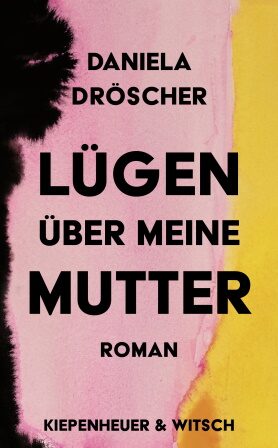Daniela Dröscher
Lügen über meine Mutter
[Lies About My Mother]
- Kiepenheuer & Witsch Verlag
- Cologne 2022
- ISBN 978-3-462-00199-0
- 448 Pages
- Publisher’s contact details
For this title we provide support for translation into the Italian language (2022 - 2024).
Sample translations
An everyday story about women
A quick comparison of this setting and the biographical details pertaining to Daniela Dröscher herself, born 1977, immediately demonstrates that Lügen über meine Mutter (‘Lies about my mother’) is an example of autofiction, a genre increasingly encountered in contemporary German-language literature. However, in her novel Daniela Dröscher goes far beyond the merely autobiographical and private in both illuminating and reflecting aspects of the social history of the everyday lives of women that are often overlooked both in ‘official’ histories and in personal accounts of family life – and which for that very reason are still operative, consciously or unconsciously, in the lives of the women of succeeding generations; one such aspect is the gulf between, on the one hand, the promise of a fulfilling career in the workplace, and, on the other, the realities of having to care for others, while another is the constant if often subliminal challenge of idealised body images.
For practically all the parental arguments that Daniela Dröscher has her childish alter ego recount derive from the same source: her father’s animosity regarding the body of his wife. To put it in brief and brutal terms: in his eyes, she is simply too fat. And he doesn’t limit himself merely to reproaches: he forces her to go on diets and sign up for treatment plans; he controls her food intake; he stands by the scales and records her weight, noting down even the slightest variations. He even blames his wife’s body for the fact that his own career has stalled.
The form that Daniela Dröscher chose in writing Lügen über meine Mutter is unusual. The story of the years 1983-85, which is narrated from a child’s point of view, is interspersed with essayistic passages reflecting on the adult author’s point of view – on her actual writing process and on those aspects of the narrative that lay beyond her understanding while she was a child. It is here that the wider social circumstances are discussed that reinforced or perhaps even determined the family dynamic: after all, it wasn’t until 1977, the year of Dröscher’s birth, that women in West Germany were allowed to work without first getting their husband’s permission. For mothers this new freedom usually remained an empty promise, since state-funded childcare facilities were extremely rare.
Such was the lot of the mother in Dröscher’s novel. By dint of repeated bursts of energy and occasional more or less anodyne lies she manages to resist the ‘othering’ of her body, and she also tries to gain a foothold in the world of work in the brief periods of time left to her by her inescapable housewifely obligations and the burdens of caring for first one daughter and then two.
The way that the father in Lügen über meine Mutter rations out the family’s money while indulging himself in a succession of new cars, preferably convertibles, reflects the typical behaviour pattern of those men who in the ever-shifting currents of the Wirtschaftswunder vacillated between the urge for self-advancement and the desire for prestige, between conformism and the imperative of frugality. This pattern may well have derived from the parents’ wartime experiences, just as the body-image so aggressively promulgated by the father clearly had its origins in the ascetic, steel-hard body of nazi ideology.
Let us not reveal the surprising ending of this tragic marriage. But we certainly can say that Daniela Dröscher has achieved something remarkable in her novel by talking about her mother’s body without yet again putting it on display, without subjecting it in all its rawness to the gaze and the judgement of others. And by dint of using the first person and looking back at her own history, she opens our eyes to fundamental patterns and processes at work within our society.
Translated by John Reddick

By Wiebke Porombka
Wiebke Porombka is a literature editor at the radio station Deutschlandfunk, and a member of various literary juries, not least as panel Chair for the Wilhelm Raabe Prize for Literature.
Publisher's Summary
Daniela Dröscher writes about growing up in a family where one topic dominates everything: her mother’s body weight. Is this beautiful, headstrong, unpredictable woman too fat? Does she urgently need to lose weight? Yes, she does – her husband decides. A decision the mother is subjected to, day after day.
Lies About My Mother is two things at once: the story of a childhood in the 1980s, increasingly overshadowed by the father’s obsession that his wife’s excess weight is to blame for everything he can’t get: a promotion, social advancement, recognition in the small-town community. It is also an examination of these events from the perspective of today: What really happened back then? What was concealed, what was lied about? And what does all this tell us about the bigger picture: about society, which constantly affects us, whether we like it or not?
Unsparingly and convincingly, Daniela Dröscher allows her childhood alter ego to relive the years in which this “chamber play called family” played out. The novel she has written, is as touching as it is smart, it is about subtle violence, but also about responsibility and care. Above all, however, it is a tragicomic novel about a strong woman who never stops fighting to be the master of her own life.
(Text: Kiepenheuer & Witsch Verlag)
